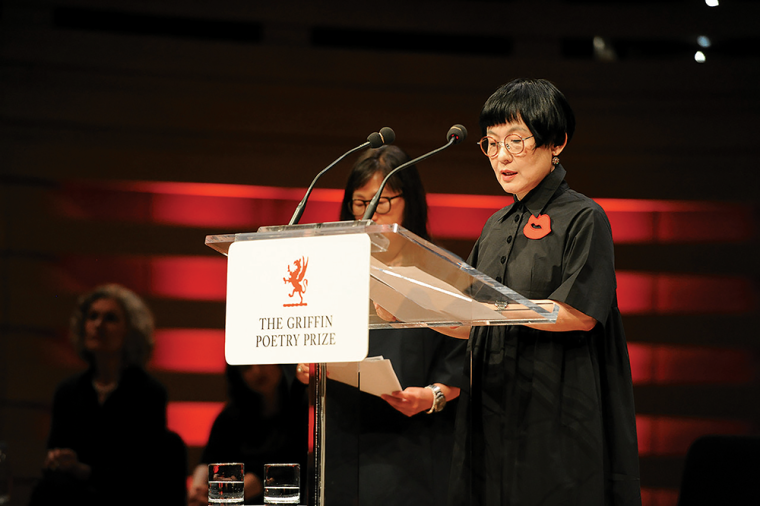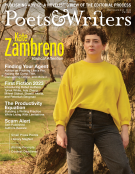For more than two decades, Canada’s Griffin Poetry Prize divided submissions into two pools: one for books written or translated into English by Canadian poets and another for such books by poets from around the world. A prize, last year valued at $65,000 Canadian (approximately $48,000), went to the winner of each cohort. Last September, however, the Griffin announced that all poets and translators would vie for a single prize. Worth $130,000 Canadian (approximately $96,000), the Griffin is now reportedly the largest international award of its kind. The change has drawn criticism from some in the Canadian literary world who fear that Canadian poets and presses are losing a major platform.

South Korean poet Kim Hyesoon reads from Autobiography of Death (New Directions, 2018), winner of the 2019 international Griffin Poetry Prize, during a ceremony in Toronto with translator Don Mee Choi (left). (Credit: Griffin Poetry Prize)
Canadian businessman Scott Griffin, who cofounded the Griffin Poetry Prize in 2000 alongside five acclaimed writers serving as trustees, including Margaret Atwood and Robert Hass, frames the change to the prize as a sign of confidence in Canadian poetry. While the dual-winner system was conceived to put Canadian and international poets on the same stage at a time when Canadian poets needed publicity, today “Canadians can more than hold their own,” Griffin says.
But the idea that Canadians are now competing on “equal footing” with their peers abroad, as Griffin has told the media, is “disingenuous at best,” according to Canadian writer Alicia Elliott. In a September 2022 column for the Canadian Broadcasting Corporation (CBC), she argued that poets outside Canada tend to be “better funded and more widely reviewed,” factors that may make them more competitive for the prize or finalist list. To be considered for the Griffin, a press must submit a first-edition poetry collection published during the year prior to the award. In the case of translated works, translators split the cash prize with the original poet; the former receives 60 percent and the latter 40 percent of the award. (Self-published books are ineligible.)
As it turns out, three Canadians did make this year’s longlist and two progressed to the shortlist: Susan Musgrave for Exculpatory Lilies (McClelland & Stewart, 2022) and Iman Mersal for The Threshold (Farrar, Straus and Giroux, 2022), translated from the Arabic by Robyn Creswell, who is American. But they were up against three U.S. poets: Ada Limón, Ocean Vuong, and the eventual winner, announced on June 7, Roger Reeves.
The Griffin organization has offered something of a consolation prize to Canadians, creating a new award of $10,000 Canadian (approximately $7,400) for a first book by a Canadian poet, selected from the submissions to the larger international prize. The 2023 winner, announced in May, is Emily Riddle for The Big Melt (Nightwood Editions, 2022). But even as it carves out space for debut Canadian poets, that prize is evidently a very different kind of opportunity than the flagship Griffin. Previously there were three Canadian finalists, each of whom received at least $10,000 Canadian. Now the Griffin judges will select a ten-book longlist and a five-book shortlist of international poets; shortlisters will each receive $10,000 Canadian.
Poet D.M. Bradford says their life transformed after being named a finalist for the 2022 Canadian prize for their debut collection, Dream of No One but Myself (Brick Books, 2021). It was a “huge factor” in their ability to quit their day job to pursue poetry full-time. The recognition bolstered both their confidence and profile. “Nothing else I’ve experienced can be compared to the scope of the media coverage the Canadian prize was able to generate,” they say. “Opportunities, interest in my work, and platforms to present it grew in a way I could never have expected.” As a finalist, the $10,000 Canadian Bradford received gave them “an added bit of stability.”
Money and professional opportunity aside, Bradford says the restructuring betrays a misunderstanding of why Canadians valued the national prize: “The place the Griffin earned in the Canadian poetry community wasn’t a matter of it leveling the playing field for our poets; it was the fact that it massively celebrated our poets and their work because they’re worthy of massive celebration.” Bradford questions the impulse to have Canadians measure up against those elsewhere: “There’s real insecurity in the argument that celebrating Canadian poetry on its own was some kind of cheat code.”
Alayna Munce, publisher of the Canadian poetry press Brick Books, similarly extolled the value of the national prize: “For over twenty years it opened a space for serious public conversation about Canadian poetry.” Brick Books published Bradford’s shortlisted volume as well as three other Griffin finalists and two winners. “Literary prizes are huge for the discoverability of our books,” Munce says. “And even bigger as door-openers for our poets.”
The discord between Griffin and some Canadian poets, then, is at least partially philosophical—or reflects different priorities. Scott Griffin believes in doubling down on the international prize because “poetry crosses all borders,” he says. He expressed concern that Canada sometimes has a “parochial view” of the arts, prioritizing the local at the expense of the international. Surely many Canadians would dispute this claim, but as critic Amanda Perry points out in the Canadian literary journal the Walrus: “Philanthropists can, at the end of the day, do whatever they think is best.”
It remains to be seen whether the Griffin can rally the “massive celebration” for global poetry in English that it did for Canadian poetry. James F. English, the author of The Economy of Prestige: Prizes, Awards, and the Circulation of Cultural Value (Harvard University Press, 2005), says it is difficult to earn status on the international stage. Individual poets may be thrilled by the opportunity to win $130,000 Canadian ($96,000), but the Griffin must still compete with many older national and international awards to capture the attention of a global audience and achieve Scott Griffin’s stated objective to “raise the profile of poetry.”
The deadlines for submissions to the 2024 Griffin Poetry Prize are June 30 for books published between January 1 and June 30, 2023, and December 31 for books published in the second half of the year.
Spencer Quong is a writer and editor from the Yukon, Canada.









